
The Hotel industry emerges stronger in a post Covid world
Posted by : Sheen Hitaishi | Fri Mar 10 2023

[vc_row type=”in_container” full_screen_row_position=”middle” column_margin=”default” column_direction=”default” column_direction_tablet=”default” column_direction_phone=”default” scene_position=”center” text_color=”dark” text_align=”left” row_border_radius=”none” row_border_radius_applies=”bg” overflow=”visible” overlay_strength=”0.3″ gradient_direction=”left_to_right” shape_divider_position=”bottom” bg_image_animation=”none”][vc_column column_padding=”no-extra-padding” column_padding_tablet=”inherit” column_padding_phone=”inherit” column_padding_position=”all” column_element_spacing=”default” background_color_opacity=”1″ background_hover_color_opacity=”1″ column_shadow=”none” column_border_radius=”none” column_link_target=”_self” column_position=”default” gradient_direction=”left_to_right” overlay_strength=”0.3″ width=”1/1″ tablet_width_inherit=”default” tablet_text_alignment=”default” phone_text_alignment=”default” animation_type=”default” bg_image_animation=”none” border_type=”simple” column_border_width=”none” column_border_style=”solid”][vc_column_text css=”.vc_custom_1678444935276{margin-right: 16px !important;margin-left: 16px !important;border-right-width: 10px !important;border-left-width: 10px !important;}”]The hotel industry was among the worst-hit sectors in FY21 and FY22 on account of the pandemic. However, as we have progressed through the current financial year, the hotel industry is back in action and Q3FY23 has been particularly exceptional for all the hotel chains with a surge in revenues and profits in this quarter. Some have even surpassed their pre-Covid revenues in this quarter.
What aided the dramatic growth in this quarter is the festive season and weddings. Apart from these, post Covid leisure and business travel has also increased which is driving the demand for hotel rooms across the country.
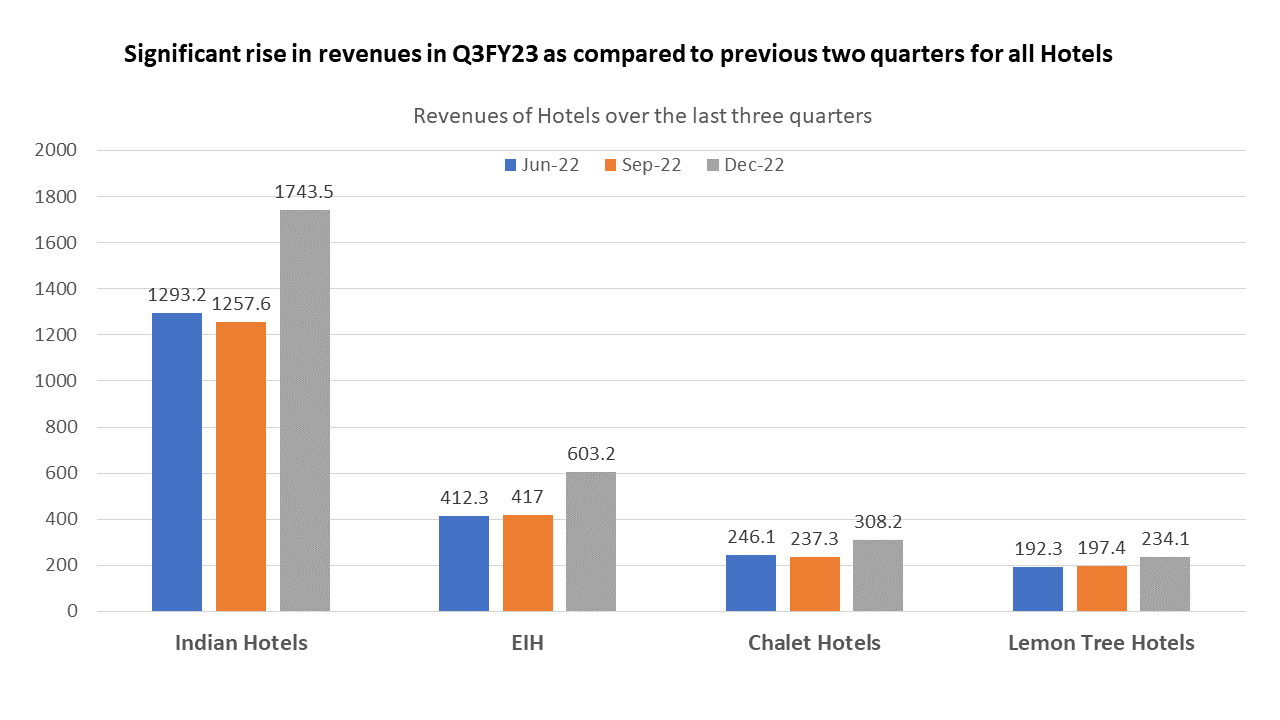
When the pandemic hit, India’s hotel industry saw three key metrics plunge. One, the average daily rate (ADR), or what a guest pays for a room per night, two, the occupancy rates denoting the percentage of rooms that are occupied in a hotel at any given time and third the resulting revenue generated per available room (RevPAR). The industry has consistently improved since then on all three parameters. Occupancy rates are rising with the revival of in-person meetings and leisure travel. Average daily rates have jumped by nearly 30% between July 2022 and December 2022.
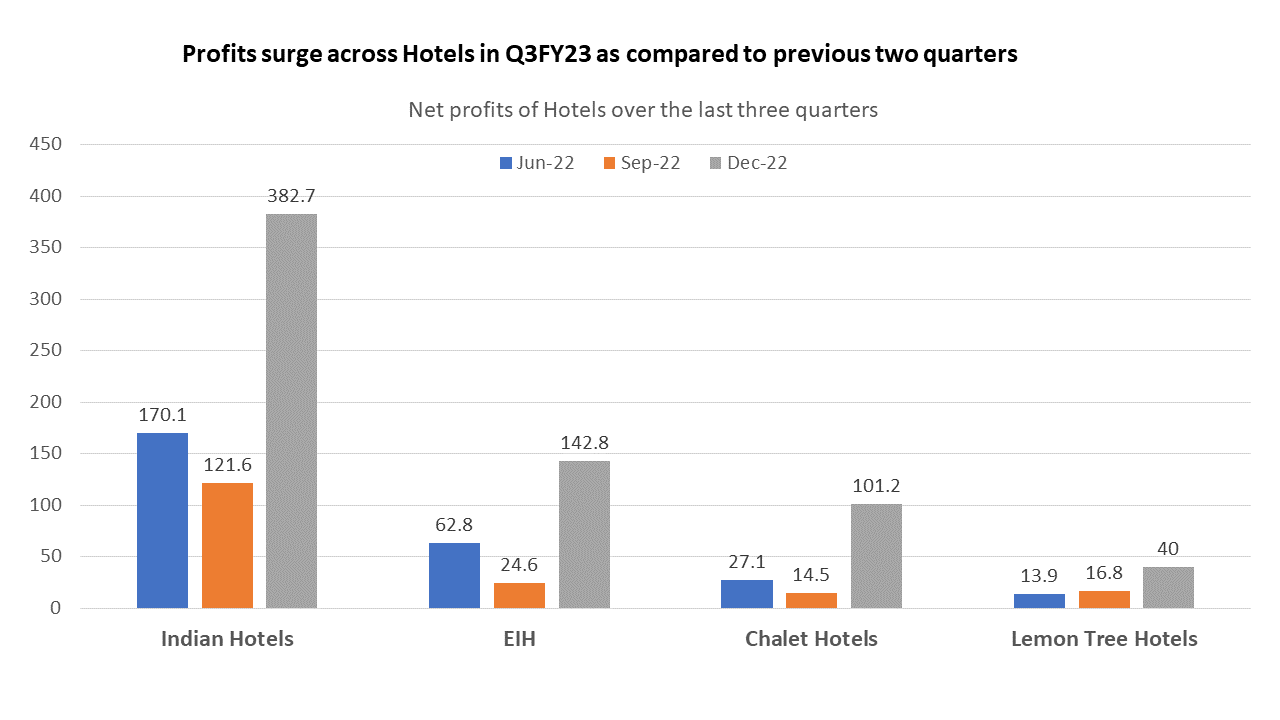
Puneet Chhatwal, CEO of Indian Hotels Co, believes that the continuous rise in travel can no longer be attributed to pent-up demand, as nine months have gone by since the last wave of Covid ended. According to him, “There is a permanent shift in customer behaviour. They are now combining business with leisure or taking extended weekends by driving to a destination and working from there.”
The domestic hotel industry is also a beneficiary of India’s G20 presidency. Meetings and events linked to G20, as well as corporate summits and seminars, have led to a substantial increase in demand and room rates for hotels in key cities.
Many of the hotel chains have regained their pre-Covid levels metrics, a case in point being EIH, more commonly known as the Oberoi Hotels, which saw its RevPAR cross pre-Covid levels in Q3FY23.
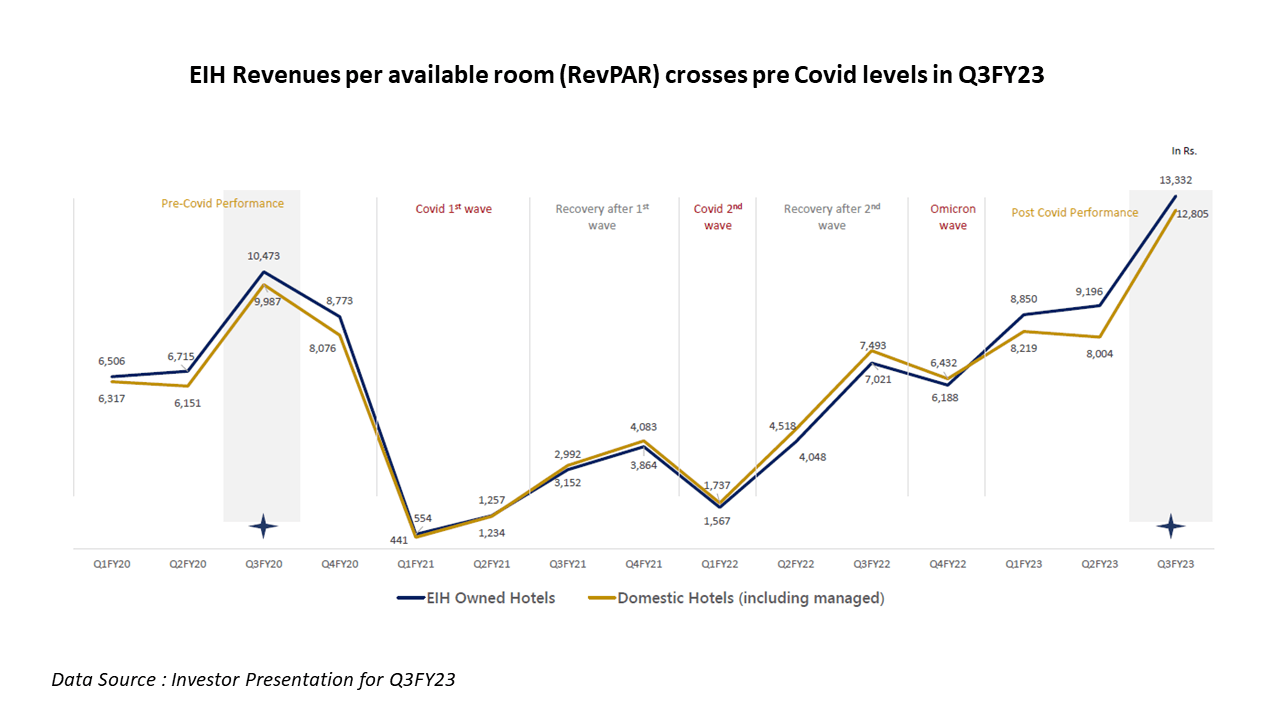
With substantial demand growth in the foreseeable future, hotel chains have chalked out their expansion plans. These will bode well for the sector as we witness an increase in business and leisure travel. One factor that will act as a catalyst is the growth of air travel in India. Correlating this with one of the largest orders for airplanes by Air India, a direct fallout is a demand for more hotels with rising air travel.
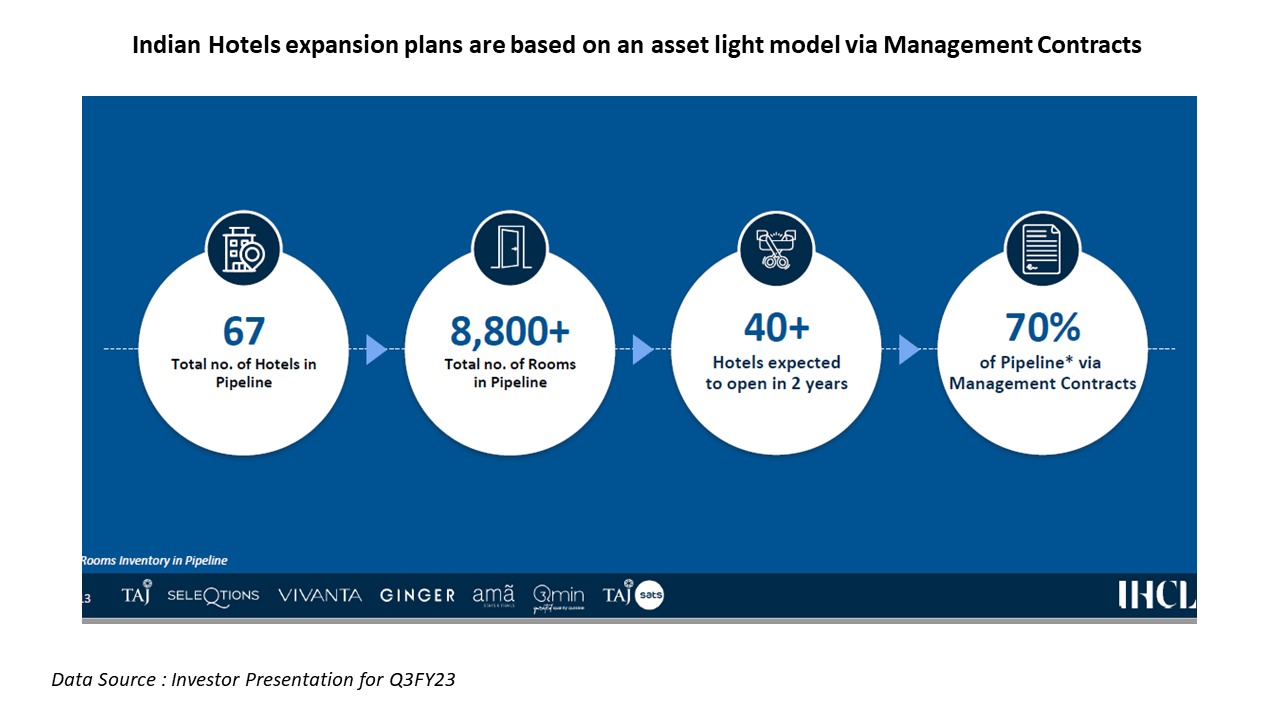
Indian Hotels, the hotel division of the Taj group plans to add another 8,800 rooms over the next three years. The company is following an asset-light model for its growth plans. The CEO of Indian Hotels, Puneet Chhatwal said that 75 percent of their future projects are based on management contracts, which means that Indian Hotels will be partnering with other companies to manage hotels rather than owning them outright. This is a strategy that allows them to expand their portfolio without taking on as much risk as well as capital expenditure.
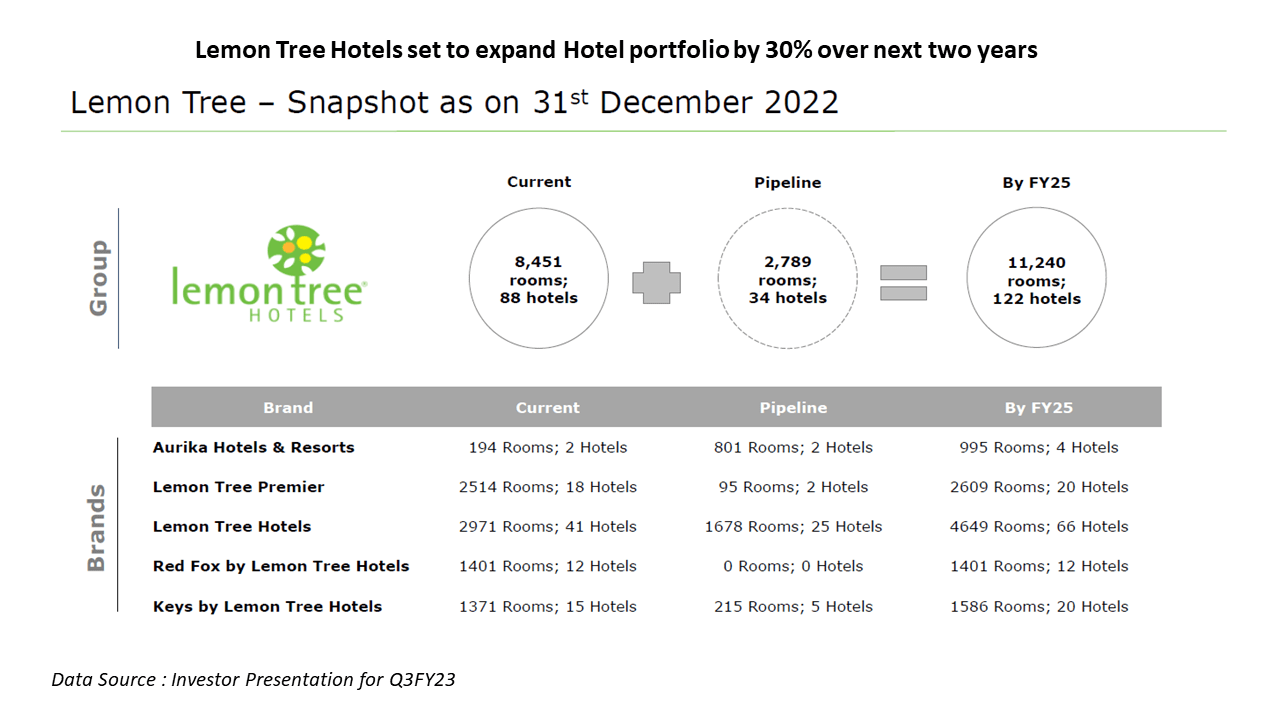
Apart from Indian Hotels, another hotel chain that has massive expansion plans is Lemon Tree. This chain intends to increase its total hotel portfolio by 30 percent over the next three years.
The coming four years would be the “golden period” as the industry will see more profits in cumulative terms than in the last 20 years, Patanjali Keswani, chairman and managing director of Lemon Tree Hotels Ltd., said in a recent media interview.
For the industry as a whole, the hotel addition would happen across the country. Bengaluru and Mumbai are expected to lead in the expansion of the same. Of the proposed supply of about 6,800 branded hotel rooms in Bengaluru, over 51% will be either mid-market or upper mid-market, and 17% will be budget rooms, according to Hotelivate, a consulting firm.
India lags behind the rest of the world in hotel room supply. Globally, the penetration of hotel rooms per 1,000 population is 2.7, 2.8 in China, and 16 in the US. But in India, it’s only 0.1, indicating massive scope for growth, especially as the country witnesses higher spending power with each passing year.
On a stock market return basis, Indian Hotels has delivered a return of 46.2% over the last year, EIH delivered 24.5%, Chalet Hotels delivered 32.3% and Lemon Tree Hotels delivered 26.5% returns for the same time, outperforming the Nifty by a wide margin. On a long-term horizon, Indian Hotels, EIH, and Chalet Hotels have a “Buy” rating on the Univest app, while Lemon Tree Hotels has a “Hold” rating.
Investors keen on investing in this sector can follow these stocks on the Univest app for insights, entry as well as timely exit to optimise their returns from this sector.
ABOUT THE AUTHOR
Ketan Sonalkar (SEBI Rgn No INA000011255 )
Ketan Sonalkar is a certified SEBI registered investment advisor and head of research at Univest. He is one of the finest financial trainers, with a track record of having trained more than 2000 people in offline and online models. He serves as a consultant advisor to leading fintech and financial data firms. He has over 15 years of working experience in the finance field. He runs Advisory Services for Direct Equities and Personal Finance Transformation.
Note – This channel is for educational and training purpose only & any stock mentioned here should not be taken as a tip/recommendation/advice
You may also like: Ways to save tax on Capital Gains[/vc_column_text][/vc_column][/vc_row]
Related Posts
Weekly Update- 02 January 2026
Victory Electric Vehicles International IPO GMP & Review: Apply or Avoid?
Best Small-Cap Mutual Funds for high growth potential
Best Mutual Funds To Invest in India For High Returns
Modern Diagnostic IPO Allotment Status Check Online: GMP, Subscription, Price, and More

